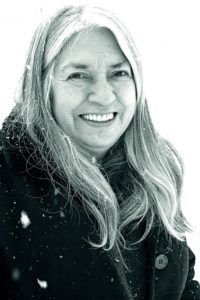Lee Maracle is one of Canada’s most prominent aboriginal writers. An active activist, she has travelled across Canada, written many books, and proven that if you’re dedicated you can make your voice heard.
“I live my life as I live my life. I’m what I call a sovereign Stó:lō woman,” says Maracle. “I live my life in a certain way, as did my grandmother, my great-grandmother, my great-great-grandmother, and her mother, who was the princess of peace for our nation; my children live this way.”
Maracle will be visiting Camosun as part of the Open Word: Reading and Ideas event. She has been publishing books consistently since the ’70s, and Maracle says that she first visited Camosun when she was 19 years old; this time around, she will be reading from her newer material.

“I’m probably going to read from my new work, Celia’s Song. It’s about this double-headed serpent and the struggle between the split mind,” says Maracle. “It’s a novel taking place in Stó:lō territory.”
Though known more for her fiction, Maracle has also written a number of non-fiction books, in which she discusses her vast knowledge of aboriginal history and issues. She says she will be reading from her new nonfiction book, Memory Serves, published in 2015, as well as a book of poetry, Talking to the Diaspora, also from 2015.
“Memory Serves is really a series of speeches that I’ve done over time,” says Maracle. “We thought they made a good response to colonialism, and a good picture of Stó:lō philosophy.”
Maracle has spent plenty of time travelling the Salish territory, which covers all of Vancouver Island and spreads down into Montana and Washington. She has been described as a walking history book, a skill she currently applies as an instructor in the Indigenous Studies program at the University of Toronto. She is hoping to be able to teach the people who live in the territory a little more about Salish history.
“I would like them to get an idea of who we are as Salish people, because they live in Salish territory and it would be good to have the original point of view,” says Maracle. “Normally, when you move to another country, you pick up the original language and culture that’s there; that’s not what happened in our case. Instead of the settler adapting to the new country, we had to adapt to the settler who took our country, and we’re hoping to change that over time.”
Lee says that she is proud of the work that she has done and that she has been able to see change over time, which isn’t always easy.
“I believe in everything I’ve said, or done, or written,” says Maracle. “You are a little stone in a quiet pond and your ripples go out no matter who you are.”
Open Word: Readings and Ideas with Lee Maracle
7:30 pm Tuesday, February 28
Open Space
4 pm Wednesday, March 1
Camosun College, Room 234, Wilna Thomas Building
7:30 pm Wednesday, March 1
Open Space
openspace.ca

